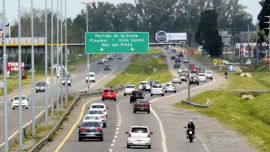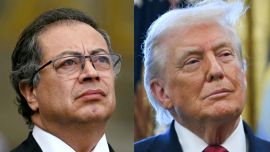Is the announcement of a multi-billion-dollar free trade agreement between the European Union and Mercosur imminent, after 25 years of difficult negotiations?
Some senior officials say a deal could happen before the end of the year but its detractors, led by France, are ramping up their opposition.
Among diplomatic institutions, rumours are swirling that an announcement is imminent, possibly as soon as during the G20 summit in Rio de Janeiro set for November 18 and 19.
An agreement between the EU and the Mercosur bloc, comprising Brazil, Argentina, Paraguay, Uruguay and now Bolivia, first began to be negotiated more than two decades ago, in 1999.
France's Minister Delegate for Foreign Trade, Sophie Primas, told AFP last week that for “the French, and for other states, the conditions are not in place today for us to be able to sign in the coming weeks.”
She described the potential signing of an agreement during the G20 summit as “very hypothetical.”
In another interview, Primas warned that “if the ratification of the treaty were to be completed against France's opinion, it would be an open breach of the trust that the French have in Europe.”
France demands that any eventual pact respect national commitments made during the Paris climate accords, and says it will ensure that the interests of European industries and farmers are protected.
‘Very close’
Consulted by AFP, Brazil's Trade & Industry Ministry reiterated “the expectation that the agreement can still be concluded this year.”
“We are very close to closing this agreement,” said Spanish Prime Minister Pedro Sánchez, one of its main pushers, last week.
The intensity of rumours about an announcement in Rio de Janeiro prompted two influential French conservative MEPs, François-Xavier Bellamy and Céline Imart, to send a letter to European Commission President Ursula von der Leyen condemning the remarks.
“According to persistent rumours, this agreement could be signed during the G20 ... We tell you straight out: this agreement, as it stands, would be a fatal blow for French and European agriculture,” they said.
Argentina’s Ambassador Marcelo Cima, secretary of international economic relations at the Foreign Ministry, pointed to the “good atmosphere” between the two blocs.
“Will it be possible to announce it at the G20 summit? I don't know, frankly, I wouldn't dare say ... I understand that some work remains to be done, but there is a very good atmosphere,” he said.
Three pillars
Cima, however, recalled that the agreement “rests on three pillars: a political pillar, a cooperation pillar and a trade and market access pillar.”
The three chapters are an inseparable part of the overall agreement.
A South American diplomat consulted by AFP said that the agreement could be announced during the Mercosur summit on 6 December, an eventuality that Sánchez also alluded to.
For this diplomat, the G20 summit in Rio de Janeiro should be attended by the French President Emmanuel Macron and the announcement of an agreement there would be an unnecessary humiliation for the president.
French farmers have already called for a large demonstration on 15 November.
The EU-Mercosur agreement would create an area of some 800 million people and aims to eliminate import duties on more than 90 percent of EU goods exported to Mercosur.
One of the critical points is the possibility that the agreement would allow the annual entry of some 100,000 tons of beef from Mercosur countries.
This possibility is causing concern among French producers, although South American sources affirm that the volume is insufficient to distort a market the size of the European one.
Deforestation fears
Meanwhile, NGOs warn that such a pact could promote deforestation for cattle farming.
According to European Union estimates currently “more than 850,000 jobs in the EU are linked to exports to Brazil alone,” while “companies from Mercosur nations employ more than 30,000 people” in the European bloc.
In 2019, the parties announced the end of the negotiation phase and the signing of a strategic partnership agreement, but new obstacles emerged.
They include the adoption of legislation in the EU requiring environmental commitments, which prompted the reopening of certain chapters of the text.
The countries of the South American bloc also asked for parts of the agreement to be updated, which prolonged the negotiations.
related news
by Aldo Gamboa, AFP























Comments